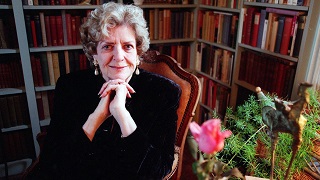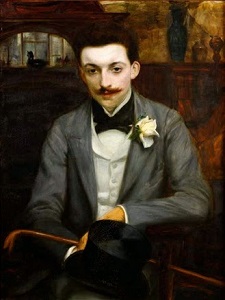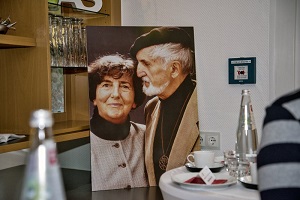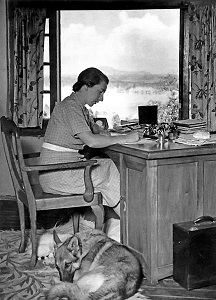De Amerikaanse dichteres Carolyn Ashley Kizer werd geboren op 10 december 1925 in Spokane, Washington. Zie ook alle tags voor Carolyn Kizer op dit blog.
Where I’ve Been All My Life
II.
Move to my room beside the Golden Horn
Where minarets strike fire against the sky.
The architecture: breasts and phalluses.
Where are the words to say that words are lies?
Yeats lied. And here Byzantium lies dead.
Constantinople? Syllables in a text.
Istanbul. Real. Embalmed in dancing dust.
Everywhere the dark-brown past gives way
To the beige of progress, that wide vacant lot.
Turkey without coffee! Endlessly we sip tea
From bud vases, and I lust for the guide,
A sultry, serious, pedantic boy
In a tight brown suit, thirsting to get out
Of the triple city weighing on his mind.
Oh, he was doomed, doomed like the dogs
On Dog Island, in the sea,
Netted and dumped and exiled, left to die,
Then skinned. We heard imaginary canine howls,
Like the rustlings of a thousand gauzy girls,
Film-eyed cattle, perishing of ennui
In abandoned harems where he guided me.
Meanwhile the Faithful, prostrate and intoning,
Stare into the light as blind as death,
Knowing for sure their end is instant Heaven.
We Infidels concede them Paradise,
Having seen heaven-as-harem, a eunuch God
In charge: the virgin slowly fattening to blubber.
Love, become feminized, tickles like a feather.
The saints of Art? Sophia, that vast barn
Holds no small Savior waiting to get born.
The formal scribble on the assaulted walls—
Five hundred years of crossing out His name!
Some famous, glittering pebbles mark the place
As God’s most grandiose sarcophagus.
Decay, decay. And the mind, a fetus, dies.

Carolyn Kizer (10 december 1925 – 9 oktober 2014)
De Franse dichter en schrijver Pierre Louÿs werd geboren op 10 december 1870 in Gent. Zie ook alle tags voor Pierre Louÿs op dit blog.
Et je m’étais fait une vie
Et je m’étais fait une vie
Si digne d’amour ou d’envie,
Une vie à décourager
Tout coeur qui lutte ou dissimule,
Tout adversaire ou tout émule,
Cerveau pensif ou coeur léger.
Maintenant ma vie est en cendres.
Ses trois merveilles les plus tendres
Ont flambé comme plume au feu
Et ma dernière destinée
Était morte avant d’être née,
Hélas ! faute d’avoir un dieu !
La pluie
La pluie fine a mouillé toutes choses, très doucement, et en
silence. Il pleut encore un peu. Je vais sortir sous les arbres.
Pieds nus, pour ne pas tacher mes chaussures.
La pluie au printemps est délicieuse. Les branches chargées
de fleurs mouillées ont un parfum qui m’étourdit. On voit briller
au soleil la peau délicate des écorces.
Hélas ! que de fleurs sur la terre ! Ayez pitié des fleurs
tombées. Il ne faut pas les balayer et les mêler dans la boue ;
mais les conserver aux abeilles.
Les scarabées et les limaces traversent le chemin entre les
flaques d’eau ; je ne veux pas marcher sur eux, ni effrayer ce
lézard doré qui s’étire et cligne des paupières.

Pierre Louÿs (10 december 1870 – 6 juni 1925)
Portret door Jacques-Emile Blanche, 1893
De Braziliaanse schrijfster Clarice Lispector werd geboren op 10 december 1925 in Podolia (Oekraïne). Zie ook alle tags voor Clarice Lispector op dit blog.
Uit: Why This World (Biografie door Benjamin Moser)
“There was an American poet who threatened to commit suicide because I wasn’t interested.” The translator Gregory Rabassa recalled being “fl abbergasted to meet that rare person who looked like Marlene Dietrich and wrote like Virginia Woolf.”
In Brazil today, her arresting face adorns postage stamps. Her name lends class to luxury condominiums. Her works, often dismissed during her lifetime as hermetic or incomprehensible, are sold in vending machines in subway stations
The Internet is alight with hundreds of thousands of her fans, and a month rarely goes by without the appearance of a book examining one side or another of her life and work. Her first name is enough to identify her to educated Brazilians, who, a Spanish publisher noticed, “all knew her, had been to her house, and have some anecdote to tell about her, as the Argentines do with Borges. Or at the very least they went to her funeral.”
The French writer Helene Cixous declared that Clarice Lispector was what Kafka would have been had he been a woman, or “if Rilke had been a Jewish Brazilian born in the Ukraine. If Rimbaud had been a mother, if he had reached the age of fifty. If Heidegger could have ceased being German.” The attempts to describe this indescribable woman often go on in this vein, grasping at superlatives, though those who knew her, either in person or from her books, also insist that the most striking aspect of her personality, her aura of mystery, evades description. “Clarice,” the poet Carlos Drummond de Andrade wrote when she died, “came from one mystery / and departed for another.”
Her indecipherable air fascinated and disquieted all who encountered her
After her death, a friend wrote that “Clarice was a foreigner on earth, going through the world as if she’d arrived in the dead of night in an unknown city amidst a general transport strike.

Clarice Lispector (10 december 1925 – 9 december 1977)
De Amerikaanse dichter Thomas Lux werd geboren op 10 december 1946 in Northampton, Massachusetts. Zie ook alle tags voor Thomas Lux op dit blog.
Pedestrian
Tottering and elastic, middle name of Groan,
ramfeezled after a hard night
at the corpse-polishing plant, slope-
shouldered, a half loaf
of bread, even his hair tired, famished,
fingering the diminished beans
in his pocket—you meet him.
On a thousand street corners you meet him,
emerging from the subway, emerging
from your own chest—this sight’s shrill,
metallic vapors pass into you.
His fear is of being broken,
of becoming too dexterous in stripping
the last few shoelaces of meat
from a chicken’s carcass, of being moved by nothing
short of the Fall of Rome, of being stooped
in the cranium over some loss he’s forgotten
the anniversary of…. You meet him,
know his defeat, though proper
and inevitable, is not yours, although yours also
is proper and inevitable: so many defeats
queer and insignificant (as illustration:
the first time you lay awake all night
waiting for dawn—and were disappointed), so many
no-hope exhaustions hidden,
their gaze dully glazed inward.—And yet we all
fix our binoculars on the horizon’s hazy fear-heaps
and cruise toward them, fat sails
forward…. You meet him on the corners,
in bus stations, on the blind avenues
leading neither in
nor out of hell, you meet him
and with him you walk.

Thomas Lux (Northampton, 10 december 1946)
De Armeense schrijver Ara Baliozian werd geboren op 10 december 1936 in Athene. Zie ook alle tags voor Ara Baliozian op dit blog.
Uit: Ara Baliozian’s blog
THOMAS MANN SPEAKS
Where there is too much talk of love, there will be very little love. Who will dare to disagree with Thomas Mann (who probably wrote more about music than any other major modern writer) when he said: “The past half century has witnessed a regression of humanity, a chilling atrophy of culture, a frightening decrease in civility, decency, sense of justice, loyalty, and faith, and of the most elementary trustworthiness.”
ON MARRIAGE
Even if you marry the most beautiful woman in the world, sooner or later she will stink of garlic. Richard Burton on Elizabeth Taylor in his recently published diary: “She stinks of garlic – who has garlic for breakfast?” He probably stank of booze morning, noon, and night.
AS I SEE IT
There is no such thing as a lovable nation. For every American who loves Armenians there will be at least two or more who love Turks. * I was the most disappointed man on earth when I met my first Turk. He was short, skinny, and timid. No fez. No yataghan. No shalvars. No bloodshot eyes. * When a face in the crowd smiles and says hello, the chances are it’s to the fellow behind you. * Books changed my worldview but music changed my life. I became a church organist. * Where the art of advertisement is developed, the brain will be underdeveloped. * There is an Armenian Christian heresy that believes the world was created not by God but the Devil. The evidence is overwhelming. * A generation of dupes will be followed by another.”

Ara Baliozian (Athene, 10 december 1936)
Kersttijd in Athene
De Duitse schrijfster Christine Brückner werd geboren op 10 december 1921 in Schmillinghausen bij Bad Arolsen in Hessen. Zie ook alle tags voor Christine Brückner op dit blog.
Uit: Die Quints
„Maximiliane blickt ihrer Tochter abwartend ins Gesicht, mit Schonung hat sie nicht zu rechnen; diese Tochter, die man von klein auf geschont hatte, weil sie dünnhäutig war, schont niemanden, noch immer sieht sie aus wie ein altgewordenes Hippiemädchen, ein Aprilkind, auf das viele Tränen gefallen sind. Irgendwas muß sie bei der Erziehung falsch gemacht haben, aber dasselbe hat sie auch bei ihren anderen Kindern schon gedacht. Viktoria sagt, nachdem sie wieder eine Weile geschwiegen hat: »Bei eurem Familientag, als ihr diese Absteige für die Reichen eingeweiht habt und du uns mit deinem kategorischen >Komm!< hierher beordert hattest, da stand ich zufällig neben jemandem, der nicht wußte, daß ich zum Clan gehöre. Er hat gesagt: >Aus den pommerschen Quints ist nach der Flucht doch nichts Rechtes mehr geworden, aus keinem.<« »Hat er das so gesagt?« »Willst du wissen, wer?« »Nein! Ich weiß ja nicht einmal genau, was das ist: etwas Rechtes.« »Ich auch nicht! Aber irgendwie hast du mir plötzlich leid getan. Am selben Abend habe ich das Angebot in der Industrie angenommen. Die Leute meinen doch alle nur Stellung und Besitz, sonst zählt doch nichts.« »Von mir hast du das nie gehört.« »Du hast zu uns gesagt: >Stehlen ist besser als betteln …«< »Habe ich das gesagt?« Viktoria zeigt ins Tal, wo man am Ufer der Pegnitz ein paar Dächer erkennen kann. »Unten im Dorf, als wir Äpfel geklaut hatten.« »Damals ist nicht heute, Tora!« »Ich stehle ja auch nicht. Aber ich will nicht mitmachen. Ich will nur weg.« »Weißt du denn auch, wohin?« »Der kommt am weitesten, der nicht weiß, wohin er geht.« »Ich weiß nicht, wo das steht, Tora, aber es ist nicht von dir.« »Von Nietzsche oder Sokrates. Ich weiß es nicht. Sokrates wäre besser! Er lebte in freiwilliger Armut. Diogenes und seine Schüler lebten wie Bettler.« »Wo gebettelt wird, muß es auch jemanden geben, bei dem etwas zu erbetteln ist.« »Du stehst auf der falschen Seite!« »Das Leben hat nicht nur zwei Seiten, Tora, es ist sehr vielseitig.« Als ihre Tochter nicht antwortet, fährt sie fort: »Die Stelle in diesem Werk, ich weiß nicht mehr, wie es hieß, entsprach doch genau deiner Ausbildung?« »Ich wollte für das Wohlergehen der Betriebsangehörigen arbeiten. Aber der Besitzer meinte das Wohlergehen seines Betriebes!«

Christine Brückner (10 december 1921 – 21 december 1996)
Hier met haar man Otto Heinrich Kühner
De Engelse schrijfster Margaret Rumer Godden werd geboren op 10 december 1907 in Eastbourne, East Sussex. Zie ook alle tags voor Rumer Godden op dit blog.
Uit: The Greengage Summer
“On and off, all that hot French August, we made ourselves ill from eating the greengages. Joss and I felt guilty; we were still at the age when we thought being greedy was a childish fault, and this gave our guilt a tinge of hopelessness because, up to then, we had believed that as we grew older our faults would disappear, and none of them did. Hester of course was quite unabashed; Will—though he was called Willmouse then—Willmouse and Vicky were too small to reach any but the lowest branches, but they found fruit fallen in the grass; we were all strictly forbidden to climb the trees.
The garden at Les Oeillets was divided into three: first the terrace and gravelled garden round the house; then, separated by a low box hedge, the wilderness with its statues and old paths; and, between the wilderness and the river, the orchard with its high walls. In the end wall a blue door led to the river bank.
The orchard seemed to us immense, and perhaps it was, for there were seven alleys of greengage trees alone; between them, even in that blazing summer, dew lay all day in the long grass. The trees were old, twisted, covered in lichen and moss, but I shall never forget the fruit. In the hotel dining-room Mauricette built it into marvellous pyramids on dessert plates laid with vine leaves. ‘Reines Claudes,’ she would say to teach us its name as she put our particular plate down, but we were too full to eat. In the orchard we had not even to pick fruit—it fell off the trees into our hands.”

Rumer Godden (10 december 1907 – 8 november 1998)
Zie voor bovenstaande schrijvers ook mijn blog van 10 december 2008 deel 1 en 2 en eveneens mijn blog van 10 december 2007 en mijn blog van 10 december 2006.
